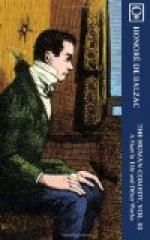“You say you love art, madame; perhaps you cultivate it successfully,” said Joseph Bridau.
“No. Without being neglected, my education was purely commercial; but I have so profound and delicate a sense of art that Monsieur Schinner always asked me, when he had finished a piece of work, to give him my opinion on it.”
“Just as Moliere consulted La Foret,” said Mistigris.
Not knowing that La Foret was Moliere’s servant-woman, Madame Moreau inclined her head graciously, showing that in her ignorance she accepted the speech as a compliment.
“Didn’t he propose to ‘croquer’ you?” asked Bridau. “Painters are eager enough after handsome women.”
“What may you mean by such language?”
“In the studios we say croquer, craunch, nibble, for sketching,” interposed Mistigris, with an insinuating air, “and we are always wanting to croquer beautiful heads. That’s the origin of the expression, ‘She is pretty enough to eat.’”
“I was not aware of the origin of the term,” she replied, with the sweetest glance at Mistigris.
“My pupil here,” said Bridau, “Monsieur Leon de Lora, shows a remarkable talent for portraiture. He would be too happy, I know, to leave you a souvenir of our stay by painting your charming head, madame.”
Joseph Bridau made a sign to Mistigris which meant: “Come, sail in, and push the matter; she is not so bad in looks, this woman.”
Accepting the glance, Leon de Lora slid down upon the sofa beside Estelle and took her hand, which she permitted.
“Oh! madame, if you would like to offer a surprise to your husband, and will give me a few secret sittings I would endeavor to surpass myself. You are so beautiful, so fresh, so charming! A man without any talent might become a genius in painting you. He would draw from your eyes—”
“We must paint your dear children in the arabesques,” said Bridau, interrupting Mistigris.
“I would rather have them in the salon; but perhaps I am indiscreet in asking it,” she replied, looking at Bridau coquettishly.
“Beauty, madame, is a sovereign whom all painters worship; it has unlimited claims upon them.”
“They are both charming,” thought Madame Moreau. “Do you enjoy driving? Shall I take you through the woods, after dinner, in my carriage?”
“Oh! oh! oh!” cried Mistigris, in three ecstatic tones. “Why, Presles will prove our terrestrial paradise.”
“With an Eve, a fair, young, fascinating woman,” added Bridau.
Just as Madame Moreau was bridling, and soaring to the seventh heaven, she was recalled like a kite by a twitch at its line.
“Madame!” cried her maid-servant, bursting into the room.
“Rosalie,” said her mistress, “who allowed you to come here without being sent for?”
Rosalie paid no heed to the rebuke, but whispered in her mistress’s ear:—
“The count is at the chateau.”




